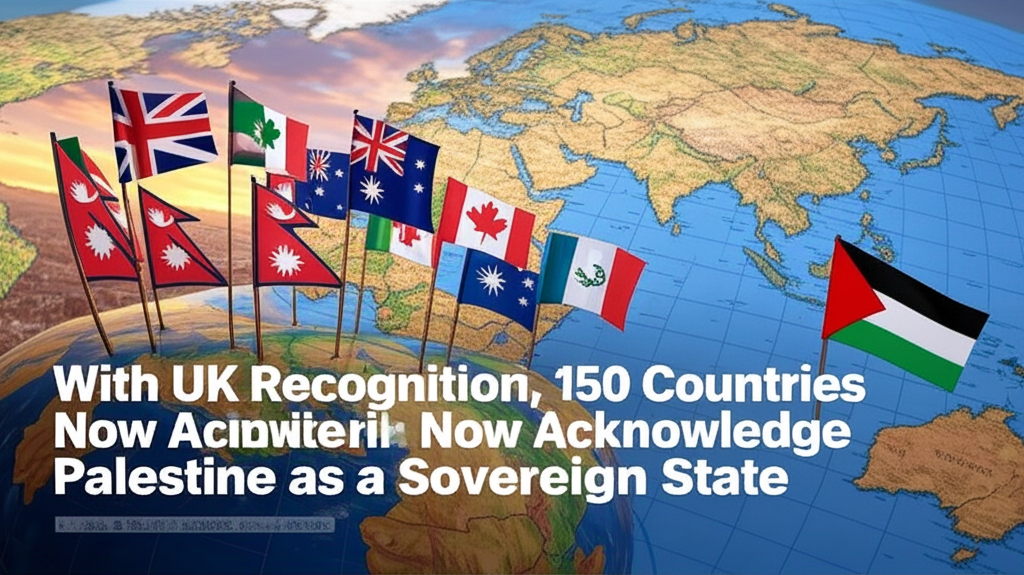The United Kingdom formally recognized Palestine as a state on Sunday, a moment that carries both historical weight and political symbolism. For Palestinians, this step from Britain is particularly striking. In 1948, it was under the British mandate that Palestinian land was partitioned, paving the way for Israel’s creation. Now, decades later, Britain has shifted course and joined the global majority supporting Palestinian statehood.
Prime Minister Keir Starmer’s announcement makes the UK one of the most influential countries to back Palestine. Canada and Australia, both former British colonies, also recognized Palestine this year.
Recognition Long Before the West
While recognition from Western powers is significant, it’s important to note that many countries extended support decades earlier. Nepal recognized Palestine in 1988, the very same year as India. Across Africa, Asia, and Latin America, dozens of governments had already taken that step long before Britain’s decision.
Momentum After Gaza
The latest wave of recognition accelerated after October 7, 2023, when Hamas carried out an attack on Israel. The Israeli military response in Gaza drew widespread criticism, with accusations of genocide and war crimes against Prime Minister Benjamin Netanyahu. The International Court of Justice even branded him a war criminal.
This shifted global sentiment. In 2024, nine countries—including Spain, Ireland, and Norway—recognized Palestine. In 2025, four more followed: Mexico, Canada, Australia, and now the UK. Recognition has spread faster in the past two years than in the previous two decades.
A Global Majority
Out of 193 UN member states, 150 now recognize Palestine. These include powerful nations such as China, India, Russia, Brazil, and South Africa, along with dozens of smaller countries across Africa, Asia, Latin America, the Middle East, and the Caribbean. The Holy See (Vatican) has also extended recognition.
Here’s the full breakdown by region:
Countries Recognizing Palestine (150 Total)
| Region | Countries |
|---|---|
| Europe | United Kingdom, Ireland, Spain, Norway, Sweden, Slovenia, Poland, Romania, Hungary, Czech Republic, Slovakia, Bulgaria, Albania, Serbia, Montenegro, Bosnia and Herzegovina, Georgia, Armenia, Belarus, Ukraine, Russia, Holy See (Vatican) |
| Middle East | Saudi Arabia, United Arab Emirates, Qatar, Kuwait, Oman, Bahrain, Lebanon, Jordan, Iraq, Syria, Egypt, Turkey, Iran |
| South Asia | Nepal, India, Pakistan, Bangladesh, Sri Lanka, Maldives, Afghanistan, Bhutan |
| Southeast & East Asia | Indonesia, Malaysia, Brunei, Philippines, Cambodia, Laos, Vietnam, Thailand, Mongolia, North Korea, China |
| Central Asia | Kazakhstan, Uzbekistan, Turkmenistan, Tajikistan, Kyrgyzstan, Azerbaijan |
| Africa (North & Horn) | Algeria, Morocco, Tunisia, Libya, Sudan, Somalia, Djibouti, Ethiopia, Egypt |
| Africa (West) | Nigeria, Ghana, Togo, Benin, Burkina Faso, Ivory Coast, Mali, Niger, Senegal, Guinea, Guinea-Bissau, Sierra Leone, Liberia, Cape Verde, Gambia |
| Africa (Central & Southern) | South Africa, Namibia, Angola, Mozambique, Zambia, Zimbabwe, Botswana, Malawi, Lesotho, Eswatini, Gabon, Republic of the Congo, Democratic Republic of the Congo, Central African Republic, Rwanda, Burundi, Equatorial Guinea, São Tomé and Príncipe, Mauritius, Seychelles |
| Latin America & Caribbean | Mexico, Brazil, Argentina, Chile, Bolivia, Peru, Ecuador, Venezuela, Colombia, Uruguay, Paraguay, Suriname, Guyana, Cuba, Dominican Republic, Nicaragua, Costa Rica, El Salvador, Honduras, Guatemala, Haiti, Belize, Jamaica, Trinidad and Tobago, Barbados, Saint Kitts and Nevis, Saint Lucia, Saint Vincent and the Grenadines, Grenada, Antigua and Barbuda, Dominica, Bahamas |
| Oceania | Australia, Papua New Guinea, Vanuatu |
What Recognition Means
Diplomatic recognition doesn’t end the conflict or guarantee sovereignty on the ground. Israel continues to occupy Palestinian territories, and peace talks remain frozen. But recognition shifts international legitimacy. Each new country that joins adds pressure on Israel and its allies while giving Palestine stronger footing at the United Nations and the International Criminal Court.
For Palestinians, Britain’s decision was more than a political gesture. It was a symbolic reversal of history—an acknowledgment from the very country once tied to their displacement. Whether it sparks movement toward a lasting peace remains uncertain, but momentum is clearly tilting toward Palestine’s side in the global arena.


